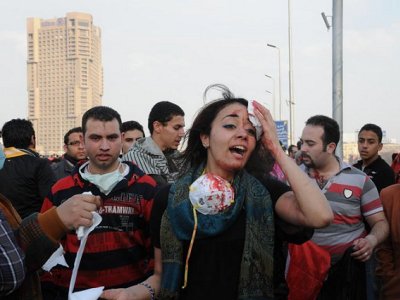
THE EGYPTIAN SQUARE
The majestic themes of history must now take account of the personal cost of political change.
Among the drama of that year’s democratic revolutions, few images were as arresting as that of Nicolae Ceausescu lecturing a crowd in Timisoara on a bright winter’s day in December 1989, only to be shouted down by people who had run out of patience with their President. The emerging signs of disbelief and panic on Ceausescu’s face were the very moment the dictator lost control of his people after nearly a quarter of a century.
Such images of revolution were rare in the late twentieth century but they are not anymore. Jehane Noujaim’s documentary of the Egyptian demonstrations in Cairo called The Square (2013) is a hauntingly beautiful and anguished first hand depiction of the uprisings first against Hosni Mubarak and then against the Muslim Brotherhood’s first President, Mohammed Morsi. Noujaim chose a handful of young Egyptians to follow in the early months of the 2011 uprising and stayed with them as events unfold in the following two years; some were democracy supporters, others were Muslim Brotherhood activists.
While TV images of huge demonstrations captured the scale of anger against the government, The Square gives us an intimate feel for the hopes, failings, aspirations and compromises of those who massed. Where Reality TV shows in the west show people self-consciously posing for the cameras in the hope of further fame, there is a beguiling lack of pretence about the characters of Ahmed, Magdy, Khalid, Rami and Ragia. Their focus is unremittingly on regime change; the lens a side show for these young people whose lives had become consumed by Tahrir Square. As an insight into the momentum, courage and fear that attempted revolution inspires, it is unlikely to be surpassed.
Adam Haslett (Prospect, March 2014), surveying the developing canon of words over the Iraq war, decided that a combination of hard journalism and intimate fiction is the best medium to convey drama; what he calls ‘the strict accuracy of reported events with the emotional force of literature’. The Square goes one better in offering us visual images.
What does this new kind of popular, people-driven media mean for us?
The sophistication of The Square enables us to learn as much, if not more, through watching events unfold rather than reading about them. Jehane Noujaim’s editing is so tight that it grants us a peculiar momentum that does not relent in a hundred minutes. Anyone wanting to know what happened in Egypt between 2011 –2013 does not need to read about it; they will learn far more by watching this.
The easy way people can film events as they unfurl enables them to cast light on places of darkness; state violence against the people – as we have seen in Kiev as well as Cairo – will be splashed across YouTube before journalists can file reports. Christians will appreciate the spiritual implications of shedding light on darkness.
The Square shows the intrinsic value of every personal human story in the midst of great change. The majestic themes of history, told grandly by historians, must now take account of the personal cost of political change.
In fairness to our current breed of historians, this is a development they have kept stride with, in their determination not to let ideological struggle trump individual testimony. Christians should give three cheers for this, for not even a sparrow dies without the awareness of God.
Two countervailing problems should not be lost to us. The first is that the camera can lie as surely as the written word. In Syria’s civil war, where citizen journalism is limited, pictures have been doctored for propaganda purposes. From thousands of miles away, it is almost impossible to make this judgment without informed help. The other concerns the limits of technology. Social media can mobilise people to demonstrate, but only mass gatherings have the power to unseat authoritarian rulers. There are prophetic echoes of Mary, in the way the mighty are cast down from their thrones. Wherever this occurs, there is a glint of the Gospel.
POPULAR ARTICLES

Obama's Covert Wars
The use of drones is going to change warfare out of all recognition in the next decades.

Through A Glass Starkly
Images of traumatic incidents caught on mobile phone can be put to remarkable effect.

What Are British Values?
Is there a British identity and if so, what has shaped the values and institutions that form it?


